
The black-necked swan is a species of waterfowl in tribe Cygnini of subfamily Anserinae. It is found in Argentina, Brazil, Chile, Uruguay, and the Falkland Islands.
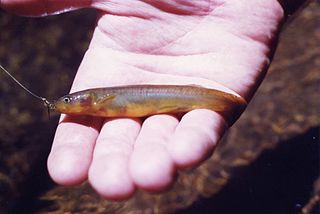
The Galaxiidae are a family of mostly small freshwater fish in the Southern Hemisphere. The majority live in Southern Australia or New Zealand, but some are found in South Africa, southern South America, Lord Howe Island, New Caledonia, and the Falkland Islands. One galaxiid species, the common galaxias, is probably the most widely naturally distributed freshwater fish in the Southern Hemisphere. They are coolwater species, found in temperate latitudes, with only one species known from subtropical habitats. Many specialise in living in cold, high-altitude upland rivers, streams, and lakes.

The striated caracara or Forster's caracara is a Near Threatened bird of prey of the family Falconidae, the falcons and caracaras. It is found in Argentina, Chile, and the Falkland Islands. In the Falklands it is known as the Johnny rook, probably named after the Johnny penguin.

Deschampsia is a genus of plants in the grass family, commonly known as hair grass or tussock grass. The genus is widespread across many countries.

Prodidominae is a family of spider, sometimes called long-spinneret ground spiders. It was formerly regarded as a subfamily of Gnaphosidae, but was raised to a family in 2022.
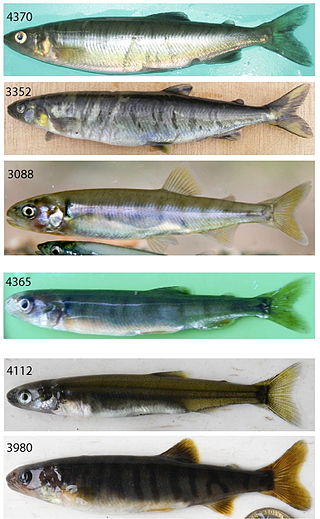
Aplochiton is a genus of osmeriform fish of the family Galaxiidae native to Argentina, Chile and the Falklands Islands.

The austral parakeet, austral conure, or emerald parakeet is a species of bird in subfamily Arinae of the family Psittacidae, the African and New World parrots. It is found in Argentina, Chile, and possibly the Falkland Islands.

The chimango caracara is a species of bird of prey in the family Falconidae, the falcons and caracaras. It is found in Argentina, Bolivia, Brazil, Chile, Paraguay, and Uruguay, and as a vagrant on the Falkland Islands.

Uncinia is a genus of flowering plants in the family Cyperaceae, known as hook-sedges in Australia and as hook grasses or bastard grasses in New Zealand. The genus is characterised by the presence of a long hook formed by an extension of the rachilla, which is used to attach the fruit to passing animals (epizoochory), especially birds, and it is this feature which gives the genus its name, from the Latin uncinus, meaning a hook or barb.

The Parish of the Falkland Islands is an extra-provincial church in the Anglican Communion. In 1869, the "Diocese of the Falkland Isles" with jurisdiction over the rest of South America except for British Guiana was established. The name was due to a legal technicality: at that time there was no way an English bishop could be consecrated for areas outside the jurisdiction of the Crown. From the start, the bishop resided in Buenos Aires and had his administrative office there. From 1902 to 1973, the jurisdiction of the diocese was progressively reduced in area as more dioceses were established in South America and after the formation of the "Consejo Anglicano Sudamericano" in 1973 as a step towards the formation of a new province of the Anglican Communion the Parish became extra-provincial under the direct jurisdiction of the Archbishop of Canterbury. Until the war between Britain and Argentina in 1982, at the Archbishop's request episcopal functions were performed by the Anglican Bishop of Argentina.

Octodontidae is a family of rodents, restricted to southwestern South America. Fourteen species of octodontid are recognised, arranged in seven genera. The best known species is the common degu, Octodon degus.

Carabinae is a subfamily of ground beetles in the family Carabidae. There are about 10 genera and more than 1,400 described species in Carabinae.
Lissopterus is a genus of ground beetles in the family Carabidae. There are at least two described species in Lissopterus.
Migadops is a genus of ground beetles in the family Carabidae. There are at least two described species in Migadops.
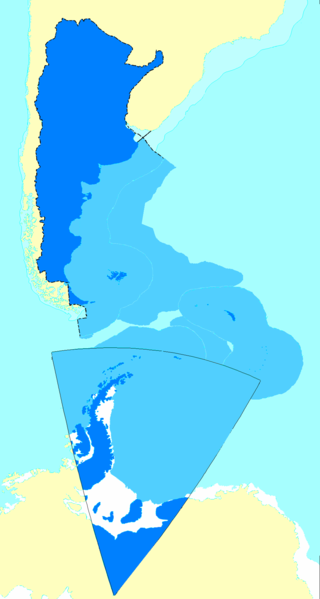
Argentine irredentism is the idea of Argentina's sovereignty over the British Overseas Territories of the Falkland Islands, South Georgia and the South Sandwich Islands, along with the dispute with Chile over the Southern Patagonian Ice Field and disputes with both over the region designated as Argentine Antarctica.

The graytail skate, or gray tail skate, is a large species of skate in the family Arhynchobatidae, native to the south-western Atlantic Ocean and south-eastern Pacific Ocean. It is listed as endangered by the IUCN. It was caught as part of a commercial fishery around the Falkland Islands and is a bycatch in several other fisheries.

Pseudomorpha is a genus of beetles in the family Carabidae, found in North, Central, and South America.
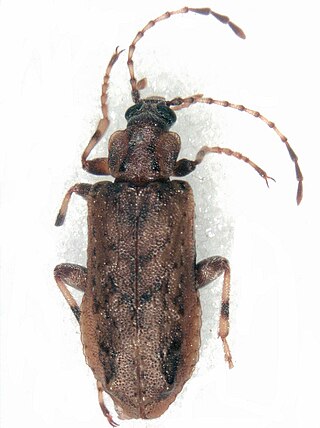
Promecheilidae is a family of beetles in the superfamily Tenebrionoidea. They were formerly included in a family called Perimylopidae. They are found in southern South America and associated archipelagos like South Georgia and the Falklands, New Zealand and Tasmania. Some species are associated tree ferns and moss-covered dead wood, and other forested habitats, while others are associated with peat bogs, grasslands and coastal habitats. They are probably phytophagus, feeding on lichen, moss, and other plant material.
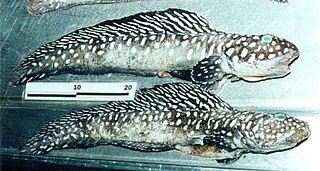
Iluocoetes is a monospecific genus of marine ray-finned fish belonging to the family Zoarcidae, the eelpouts. The only species in the genus is Iluocoetes fimbriatus. This species is found off southern South America, off Chile and Argentina, in the southeastern Pacific and southwestern Atlantic Oceans.

Migadopini is a tribe of ground beetles in the family Carabidae. There are about 16 genera and more than 40 described species in Migadopini.

















